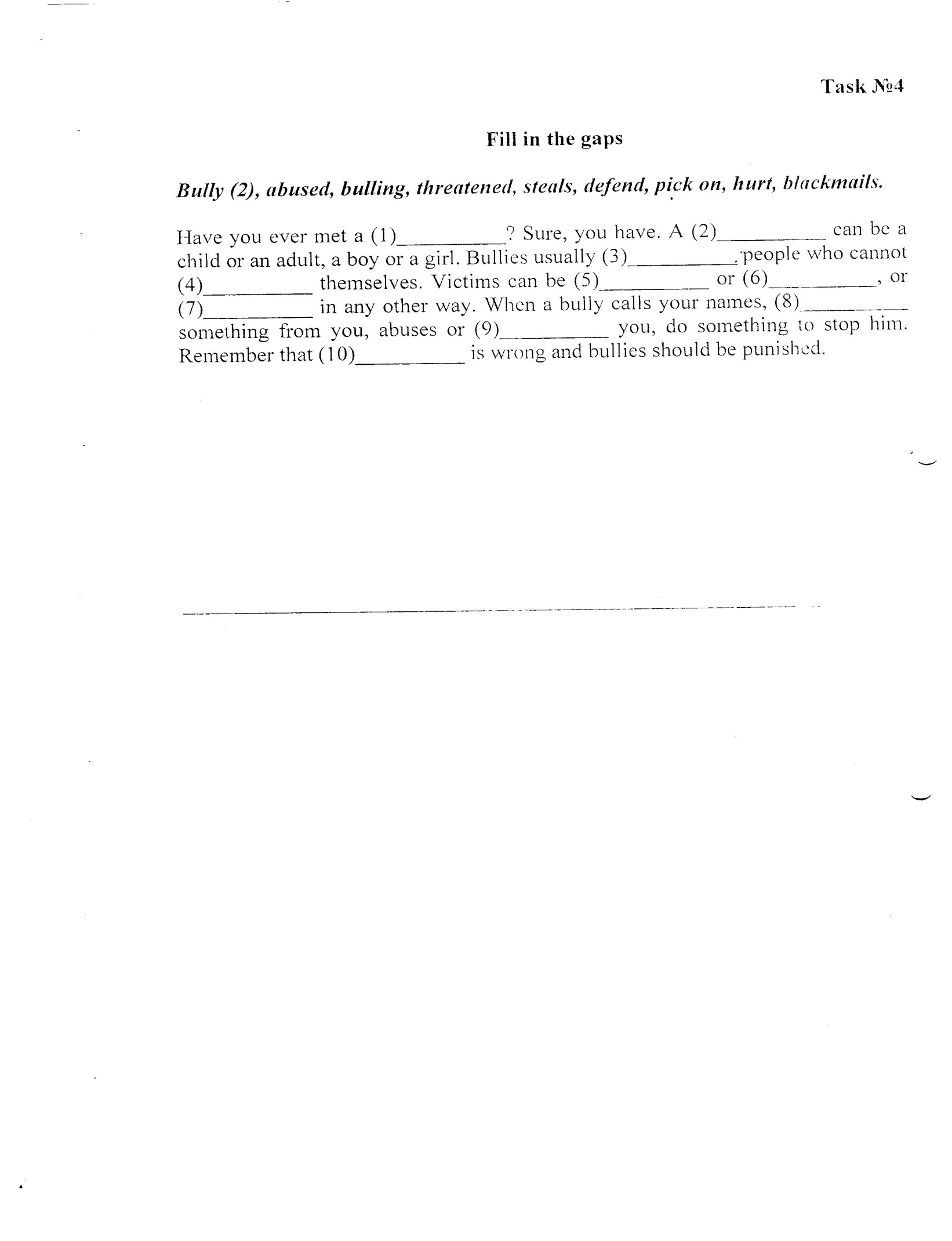- Преподавателю
- Иностранные языки
- Конспект урока по английскому языку 8 класс Bulling
Конспект урока по английскому языку 8 класс Bulling
| Раздел | Иностранные языки |
| Класс | 8 класс |
| Тип | Конспекты |
| Автор | Попова Е.П. |
| Дата | 03.08.2015 |
| Формат | docx |
| Изображения | Есть |
Конспект проведения урока английского языка
на тему: «What is bullying?»
в 8 классе
Подготовила:
учитель английского языка
Попова Е.П.
Цель: формирование способности учащихся к саморазвитию и самосовершенствованию путем сознательного и активного присвоения нового социального опыта, активизации творческих способностей в условиях образовательной среды.
Задачи:
-
Активизировать навыки монологической речи по теме
-
Совершенствовать лексические и орфографические навыки
-
Развить навыки просмотрового чтения
-
Актуализировать новую лексику
-
Отработать фонетические навыки
-
Развить навыки коллективной работы
Планируемые результаты:
-
Личностные: знать и соблюдать правила поведения в сложных жизненных ситуациях, уважать права и свободы личности; проявлять уважительное отношение к партнерам.
-
Метапредметные: работать с прочитанным текстом и таблицами/ кластерами, осуществлять информационный поиск, решать проблемы творческого и поискового характера, работать со словарем; владеть основами самоконтроля, строить логическое рассуждение и делать выводы.
-
Предметные: передавать основное содержание, основную мысль прочитанного, читать аутентичные тексты с выборочным пониманием интересующей информации, уметь применять правила написания слов, уметь осуществлять индивидуальную и совместную работу.
Тип урока: актуализация новых знаний.
Технология: системно-деятельностного подхода, критического мышления.
Раздаточный материал: распечатанные задания для групп (приложения 1-3, листы формата А4 для каждой команды, цветные карандаши, маркеры.
Оборудование: УМК "Enjoy English" для 8-го класса (М.З. Биболетова, О.А. Денисенко, Н.Н. Трубанева ); презентация к уроку « What is bullying ?»; CD "Enjoy English-8" (Unit 4 Section 3 ex. 35).
Дополнительный материал: приложения с распечатанными заданиями.
Ход урока
I.Организационный момент. Мотивация.
T- Good morning, children!
- I am glad to see you. How are you today? Have you got any problems in your life? You are lucky people.
- Let's begin our lesson.
- Who is on duty today?
- Who is absent today?
- Thank you.
II..Сообщение цели урока
This time we are going to discuss a very serious problem which is very typical for teenagers.
III. Подготовка к основному этапу урока:
Проведение фонетической зарядки.
T: Look at the blackboard. Here you can see an English poem. Let's read it after me.
(Запись на доске)
Let's us try to be polite
In everything you do.
Remember always to say "please"
And don't forget "thank you".
T: Will you read it aloud, Olga?
T: - Who can you translate it? ( P1)
IV. Основной этап урока.
T: How can teenagers resolve problems?
P1: They can talk to their parents, friends.
P2: They should speak to a school psychologist or a teacher.
T: Thank you! Have you ever heard about Childline? What is it?
P: (зачитывает определение из учебника) Child line is a is the telephone line the British students call if they can't talk about their problems to anyone at home (ex.35, p.102)
А) Обучение аудированию текста.
- Now listen to a person with whom teenagers share their problems on the Childline. Listen attentively then your task is to fill in the clusters and answer the questions on ex.35, p. 102.(Приложение 1.Task №1)
(Прослушивание записи. Слайд №2)
Еx. 35, p. 102.
If you ask me, I'd say that teenager's lives are not easy these days. They are under much strain. Young people face a wide range of problems. Most typical ones are conflicts with adults: in their families, at school, in their yard, just in the street. With their parents, with their friends' parents.
So many ways of getting along with all these people!
School problems are quite typical, too: teachers and classmates, cheating and writing tests, grouping with others and feeling isolated from every one, bulling.
Love is important for a teenager, too. Through most teenagers don't easily share their secrets.
In most cases teenagers don't need my advice. What they really need is a person to talk to, someone who will listen attentively to what the teenager is talking about. Especially someone who won't criticize.
They need more special information sometimes: how to find a doctor they need, how to give up some bad habits, how to choose friends, etc.
Б). Обучение монологическому высказыванию
T: Let's discuss which problems most typical for teenagers are. Give the answers from your clusters. Compare them with the example on the screen. (Слайд №3.) ( Приложение 1)
P1: Love.
P2: Conflicts with parents, friends, classmate
P3: School problems.
P4: Feeling isolated from everyone.
T: And bulling. Have you ever heard about bullying? What is it? Do you know what this word means?
I'll help you to understand this word. Let's watch some video. (Слайд № 4)
T: This is bullying. How can you translate this word?
P1: Издевательство.
P2: Травля.
P3: Обзывания.
T: How do you think what bulling is? (Ответы учащихся)
T: Thank you for your answers! Is it an actual problem in our society?
P1: Yes, sure.
(Ответы на оставшиеся вопросы упр.35, стр. 102)
T: I see that you understand the text quite well. Before we continue let's have a rest.
Физкультминутка.
Make your left eye go wink, wink, wink
Make two eyes go blink, blink, blink,
Make two fingers stand just so,
Then ten fingers in a row.
В) Введение новой лексики.
T: Now we need more words to speak about the problems between teenages. Study the words from ex.36, p. 102. Read them after me first then your task is to match Englisn and Russian equivalents .(Task № 2) (Приложение 2)
T: Let's check (Слайд №5.). (Ученики повторяют за учителем английский вариант, переводят слова, сверяют с правильным ответом на экране)
Abuse - оскорбление
Threat - угроза
Threaten - угрожать
Blackmail - шантаж
Defend - защищать
Steal - воровать
Pick on - дразнить
Bully - хулиган
Victim - жертва
Г) Активизация навыков монологической речи и актуализация новой лексики
T: Let's read the texts and match the titles and the texts. (У обучающихся раздаточный материал , у каждой группы своя часть текста, группа находит соответствия текстов и заголовков, и заполняет таблицу).
T: Let's check. (Слайд № 6) (представители групп задают вопросы обучающимся других групп и получают ответы)
(Key: 1c) 2b) 3a) 4e) 5d).
T: Your next task is to fill in the blanks using new words. (Слайд №7) ( Task №4)
(Приложение №4)… Let's check.( P1,P2,P3…)
V. Рефлексия. (Слайд №8) ( Слайд с плакатами и телефоном доверия для подростков в РК)
T: I see that you use new words correctly. I suggest each group to make a slogan using new words and expressions, telephone number of Russian Childline. Express your attitude to the problem of bulling then present your slogan and we'll choose the best one. (Группы по очереди представляют свои плакаты, крепят их на доску и выбирают лучший).
VI. Подведение итогов урока. Выставление отметок.
T:You worked very well today. Everybody has good marks.
Your marks are….
VII.Домашнее задание (по выбору) (Слайд №9)
-
to write an article about bullying;
-
to write a script for an anti-bullying ad;
-
to do ex.35, p. 102 in a written form.

- Do you like our lesson? Did you work well?
(Ответы учащихся)
- Our lesson is over. Good bye, boys and girls! (Слайд №10)
-You worked very well today. Everybody has good marks. Your marks are….
Приложение 1
Приложение 2
Task№2
Match English and Russian words
-
Abuse [ə'bju:s] - unkind, cruel or rude words or actions.
a) угрожать
-
Threat [θret] - expression or wish to hurt or punish somebody.
b) оскорбление
-
Threaten ['θretn] - to express a threat against somebody.
c) воровать, красть
-
Blackmail ['blæk,meil] - practice of getting money or advantage by threatening.
d) дразнить, докучать
-
Defend [di'fend] - to protect someone
e) жертва
-
Steal [sti:l] - to take people's things, money.
f) хулиган, задира
-
Pick on [pik] - to choose somebody for punishment or an unpleasant job.
g) угроза
-
Bully ['bυli] - a person, who hurts or frightens weaker people.
h) шантаж, вымогательство
-
Victim [ 'viktim] - someone who has suffered as a result of the actions of other people
j) защищать
Приложение 3
Task №3
Rеad the texts. Match the titles and the texts
-
What is bullying?
-
What kind of things are called "bullying"?
-
Who is a bully?
-
What should happen to bullies?
-
What should happen to the victim?
-
a bully is a person who physically or verbally hurts someone. A bully can be a boy, a girl, a man or a woman. A bully usually picks on people who cannot defend themselves.
-
abuse, stealing, threatening and blackmail are forms of bullying. Rasism can be called bullying. Making someone feel not good or less good about themselves is bullying.
Task №3
Rеad the texts. Match the titles and the texts
-
What is bullying?
-
What kind of things are called "bullying"?
-
Who is a bully?
-
What should happen to bullies?
-
What should happen to the victim?
-
the word "bullying" covers different situations. Name calling, stealing, abuse of any kind are the forms of bullying. There is a clear definition of bullying; "It is an attempt to hurt, threaten or frighten someone".
-
the victims should talk to someone about how they feel after the bulling. Bulling must be spoken about. Students and teachers should try to prevent bullying. After all prevention is better than cure.
Task №3
Rеad the texts. Match the titles and the texts
-
What is bullying?
-
What kind of things are called "bullying"?
-
Who is a bully?
-
What should happen to bullies?
-
What should happen to the victim?
-
a bully is a person who physically or verbally hurts someone. A bully can be a boy, a girl, a man or a woman. A bully usually picks on people who cannot defend themselves.
-
bullying is wrong and if anyone is bullying they should get punished. There are different levels of bullying and various punishments.
Приложение 4



